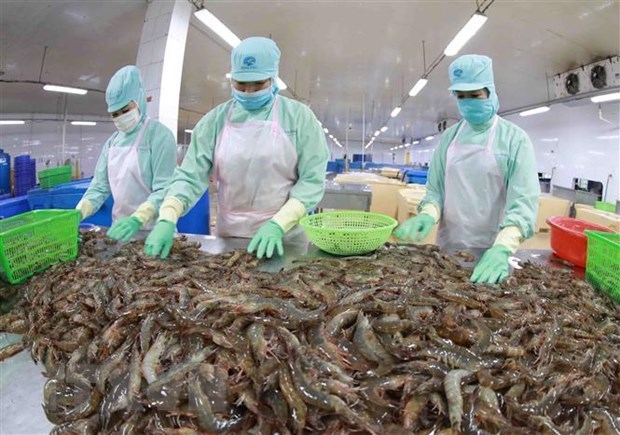Three factors for Vietnam’s sustainable economic growth: Vietnam-briefing
Infrastructure investment, trade environment and competitive labour costs are the three factors that keep Vietnam’s economy humming along and its growth numbers positive, according to an article published on the vietnam-briefing.com.
 Shrimp processed for export (Photo: VNA)
Shrimp processed for export (Photo: VNA)Specifically, the website wrote that Vietnam has spent around 6% of its gross domestic product (GDP) on infrastructure, which is among the highest in the Association of Southeast Asian Nations (ASEAN).
Among that spending were some big ticket items such as the ambitious 1,800-km HCM City–Hanoi highway; the Long Thanh International Airport, which will help reduce congestions for Ho Chi Minh City’s Tan Son Nhat; metro projects in Hanoi and HCM City; as well as thermal and waste-to-energy power plants.
The article also noted that despite these positive signs, Vietnam’s infrastructure falls short. Many factories, for example, remain labour dependent rather than using technology to automate processes.
However, the Vietnamese government is committed to changing this and has announced incentives for hi-tech industries. It has also banned the sale of used machinery more than 10 years old.
Another factor is that Vietnam is an active participant in global trade. Over the past few years, Vietnam has been active in signing bilateral trade agreements with countries around the world. Its membership in ASEAN also makes it a party to several free trade agreements (FTAs) that the regional bloc has inked.
The standard of product quality, manufacturing, and employee rights guaranteed in these agreements will allow Vietnam to become a manufacturing hub and expand its export base.
The EU-Vietnam Free Trade Agreement (EVFTA), for example, has boosted Vietnam’s exports despite the pandemic. In 2021, the UK-Vietnam FTA helped expand trade between Vietnam and the UK to nearly 6.6 billion USD. Similar increases were also noted with the Comprehensive and Progressive Agreement for Trans-Pacific Partnership (CPTPP) with exports to Canada and Mexico.
Moreover, Vietnam’s business environment is open, and the Government has provided investor-friendly policies aimed at attracting investment and socio-economic development. These are important pull factors for investors looking to invest in Vietnam. This has been made easier through Vietnam’s increasing number of FTAs.
One of Vietnam’s biggest advantages is its competitive labour costs, wrote the article. The country has a young, dynamic workforce that is ready to fill the gap. Its young labour force also comes at a relatively lower cost. More than 40% of Vietnamese university graduates major in science and engineering. As Vietnam sees its economy grow, its wages will rise. It will thus have to maintain a balance between inflation, wage levels, and productivity to avoid disrupting the overall labour market.
In conclusion, the article wrote that even as geopolitical tensions persist, Vietnam’s economic prospects are promising. In the short term, costs are likely to increase, but investors that play the long game stand to reap big rewards.
Recently, Executive Chairman of Dragon Capital Dominic Scriven said that strong purchasing power and demand have created a fast and strong locomotive for Vietnam’s economic growth, and the country is forecast to record a GDP growth rate of over 8% this year.
This is rare and high amid the context that 2022 is a year full of difficulties for not only Vietnam but also the whole world, he told the Vietnam News Agency.
The official held that this growth is driven by a purchasing power rebound after the COVID-19 pandemic, as well as the strength of the Vietnamese economy, especially political and social stability, the stability of economic and investment policies, and its openness and integration into the global economy.
Scriven noted the economy’s internal driving forces are relatively balanced and strong, from people’s demand, enterprises’ strength, and foreign investment attraction to Vietnam’s competitiveness thanks to free trade agreements, which have helped open up new markets.
Vietnam is assessed as a new and strong economy with an internationally recognised stature. It is a rare example of stability among the Southeast Asian nations, the Dragon Capital leader went on, adding that while global uncertainties this year are mainly caused by food and energy crises, it seems to haven’t suffered from too big impacts./.













